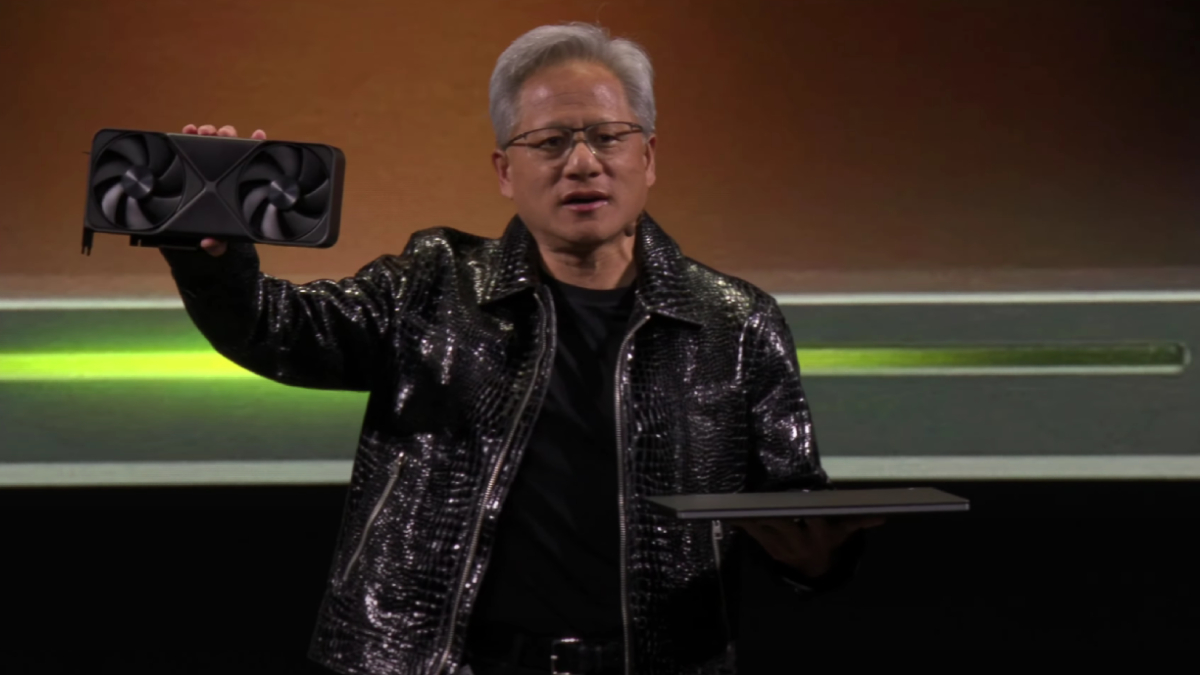RTX 5080 gaming laptop benchmark appears online, outperforms both the 4080 and 4090

Table of Contents
With the announcement of the RTX 50 series, fans of Nvidia have been treated with four new desktop GPUs to look forward to. Not only will desktop users be thinking about an upgrade, but new gaming laptops featuring RTX 50 series graphics are also on the way. In fact, CEO Jensen Huang happily showcased one of these new laptops in his keynote speech.
Now that laptops powered by 50 series GPUs have been confirmed, we have sighted a benchmark for the GeForce RTX 5080 Laptop GPU online and its OpenCL performance looks pretty impressive compared to last gen. Not only is it an improvement of the 4080, but it even scores higher than the 4090 laptop GPU.
Prime Day is finally here! Find all the biggest tech and PC deals below.
- Sapphire 11348-03-20G Pulse AMD Radeon™ RX 9070 XT Was $779 Now $739
- AMD Ryzen 7 7800X3D 8-Core, 16-Thread Desktop Processor Was $449 Now $341
- ASUS RTX™ 5060 OC Edition Graphics Card Was $379 Now $339
- LG 77-Inch Class OLED evo AI 4K C5 Series Smart TV Was $3,696 Now $2,796
- Intel® Core™ i7-14700K New Gaming Desktop Was $320.99 Now $274
- Lexar 2TB NM1090 w/HeatSink SSD PCIe Gen5x4 NVMe M.2 Was $281.97 Now $214.98
- Apple Watch Series 10 GPS + Cellular 42mm case Smartwatch Was $499.99 Now $379.99
- ASUS ROG Strix G16 (2025) 16" FHD, RTX 5060 gaming laptop Was $1,499.99 Now $1,274.99
- Apple iPad mini (A17 Pro): Apple Intelligence Was $499.99 Now $379.99
*Prices and savings subject to change. Click through to get the current prices.
RTX 5080 laptop GPU appears on Geekbench
The benchmark in question is for one of Alienware’s new Area-51 laptops, specifically the Alienware 18 Area-51 AA18250. The Geekbench 6.3.0 benchmark can be found here. The laptop features the Intel Core Ultra 9 257HX processor and RTX 5080 laptop GPU with 1.5 GHz clock speed and 16 GB of memory. When comparing these results to Geekbench 6 Open CL Benchmarks, we can get a grasp of how big the improvement is.
| Laptop GPU | OpenCL score |
|---|---|
| RTX 5080 | 190,326 |
| RTX 4090 | 179,426 |
| RTX 4080 | 160,627 |
For reference, OpenCL is a low-level API that is useful for synthetic GPU benchmarks – at least until we can get a closer look at real-world performance across a wide range of games. Based on these numbers alone, the RTX 5080 laptop GPU offers a 6% improvement over the RTX 4090, and an 18% uplift compared to its predecessor, the RTX 4080.
Again, we’re talking about laptop GPUs here; the equivalent desktop GPUs will be able to deliver even better performance. Even still, the laptop 5080 will also be able to harness the power of DLSS 4, particularly the new multi-frame generation technology Nvidia has been showcasing in its official tests.

According to Nvidia, GeForce RTX 50 series laptops will be coming in March, offering “40% better battery life thanks to new Blackwell Max-Q innovation” and “double the performance of previous-generation models” – no doubt the latter claim will be with the help of DLSS 4 as already demonstrated in official desktop GPU benchmarks.

